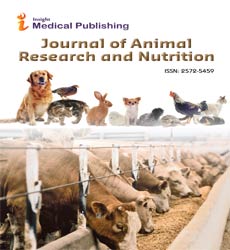Insects Commitment to the Bio Economy and the Decrease of Food Waste
Sidrak Sintayehu
Published Date: 2021-10-23DOI10.36648/2572-5459.21.6.117
Bihar Animal Sciences University, Bihar Veterinary College Campus, Patna-800014 (Bihar), India
- Corresponding Author:
- Sidrak Sintayehu
Bihar Animal Sciences University
Bihar Veterinary College Campus
Patna-800014 (Bihar), India
E-mail: sidraksintayeh@gmail.com
Received Date: October 02, 2021; Accepted Date: October 16, 2021; Published Date: October 23, 2021
Citation: Sintayehu S (2021) Insects Commitment to the Bio Economy and the Decrease of Food Waste. J Anim Res Nutr Vol.6 No.10:117. doi:10.36648/2572-5459.6.10.117
Copyright: © 2021 Sintayehu S. This is an open-access article distributed under the terms of the Creative Commons Attribution License, which permits unrestricted use, distribution, and reproduction in any medium, provided the original author and source are credited.
Abstract
The developing worldwide populace and familiarity with the impracticality of domesticated animal’s creation have driven shoppers, organizations, associations, and legislatures to consider entomophily (eating bugs) as a more economical choice. Mini live-stock offers benefits over customary domesticated animal’s creation: with more noteworthy variety, higher wholesome levels, higher energy proficiency, higher conceptive rates, lower ecological impression, and lower costs. This article expects to show how the effective execution of entomophily in the West can decidedly add to the bio economy. The article does this by investigating entomophily, introducing novel exploration on business visionaries in bug cultivating, and presenting food squander as a free, abundant, and maintainable feed asset for creepy crawly cultivates. Albeit none of the creepy crawly cultivates remembered for this exploration showed any connections between bug homesteads and food squander decrease, this is relied upon to change as the business develops.
Keywords
Agriculture; Food science; Bio Economy; Entomophily
Introduction
Creepy crawlies are viewed as a possible answer for the difficulties the current food framework is confronting and has as of late got expanded consideration around the world. In opposition to areas in Africa, Latin America, and Asia, where eating bugs is established in custom, entomophily has no roots in Western culture today [1]. In the last mentioned, bugs are more firmly connected with disdain than likely food; names, for example, "messy" and "risky" presents difficulties as far as effective execution and acknowledgment.
Developing food squander levels in the West is considered a genuine ecological, political, and social issue. Utilizing food squander as feed on bug ranches holds the likelihood to decrease food squander levels while offering free, nutritious, and ample feed for the developing number of creepy crawly cultivates [2]. Diminishing food squander levels is useful for the climate, thus it very well may be reasoned that utilizing food squander as feed for creepy crawlies on bug ranches could help the climate. The examination question directing the exploration is: Can creepy crawly cultivating make a huge commitment to food squander decrease? This exploration is planned to add to a more extensive conversation about the bio economy and food squander decrease, through checking out entomophily in Western culture, and a portion of the pioneers in bug cultivating. In this review, these pioneers function as agents for the business in Western culture. This article will examine the connection between utilizing food squander as feed on creepy crawly cultivates, presenting bugs as human food in the West, and the connection between bug ranches and the bio economy [3].
Studies that glance at how bugs can lessen food squander incorporate. The spotlight in this article is on business people in the business and on bug ranches, which none of the referenced articles take a gander at. Just as lacking data on the business people and how the ranches are run, data on advancements, advances, and strategies used to guarantee effectiveness and low expenses are missing from writing in the field. Negligible information exist on how creepy crawly cultivates impact their neighbourhood climate and the climate overall. In the current writing in the field there is additionally almost no information on sanitation issues like microbes, poisons, and metals [4]. This knowledge is viewed as important to guarantee that creepy crawly cultivates are working securely and reasonably. Having found just two investigations taking a gander at outflows from bugs (that were distributed in a global logical diary, written in English). Different texts on the subject of palatable bugs research bugs as feed for domesticated animals and hydroponics [5].
Conclusion
To notice development and pioneers is important if one wishes to see any area: what they are delivering, how they are working, which advancements are executed and concocted, and which contemplations and needs are made. This article is beginning that interaction investigating which items and bug species a couple of the business people available today are zeroing in on. Trailblazers are the leaders for the remainder of the business, making information, frameworks, and another market for others to follow. On account of creepy crawly cultivates, it is significant to notice the business visionaries since this is another area as well as because of the business' urgent requirement for information - on preliminaries and blunders, new advances, items, and environments. Assembling, surveying, and understanding information about the present status of this industry will establish the vibe for future turn of events.
References
- Abbasi T, Abbasi T, Abbasi SA (2016) Reducing the global environmental impact of livestock production: the minilivestock option. J Clean Prod 112: 1754-1766.
- Alemu MH, Olsen SB, Vedel SE, Pambo KO, Owino V (2017) Combining product attributes to assess consumer preferences for insect-based food products. Food Qual Prefer 55: 45-57.
- Belluco BS, Losasso C, Maggioletti M, Alonzi CC, Paoletti MG, et al. (2013) Edible insects in a food safety and nutritional perspective: a critical review. Compr Rev Food Sci Food Saf 12: 296-313.
- Bukkens SGF (1997) The nutritional value of edible insects. Ecol Food Nutr 36: 287-319.
- Deroy O, Reade B, Spence C (2015) The insectivore’s Dilemma, and how to take the waste out of it. Food Qual Prefer 44: 44-55.

Open Access Journals
- Aquaculture & Veterinary Science
- Chemistry & Chemical Sciences
- Clinical Sciences
- Engineering
- General Science
- Genetics & Molecular Biology
- Health Care & Nursing
- Immunology & Microbiology
- Materials Science
- Mathematics & Physics
- Medical Sciences
- Neurology & Psychiatry
- Oncology & Cancer Science
- Pharmaceutical Sciences
